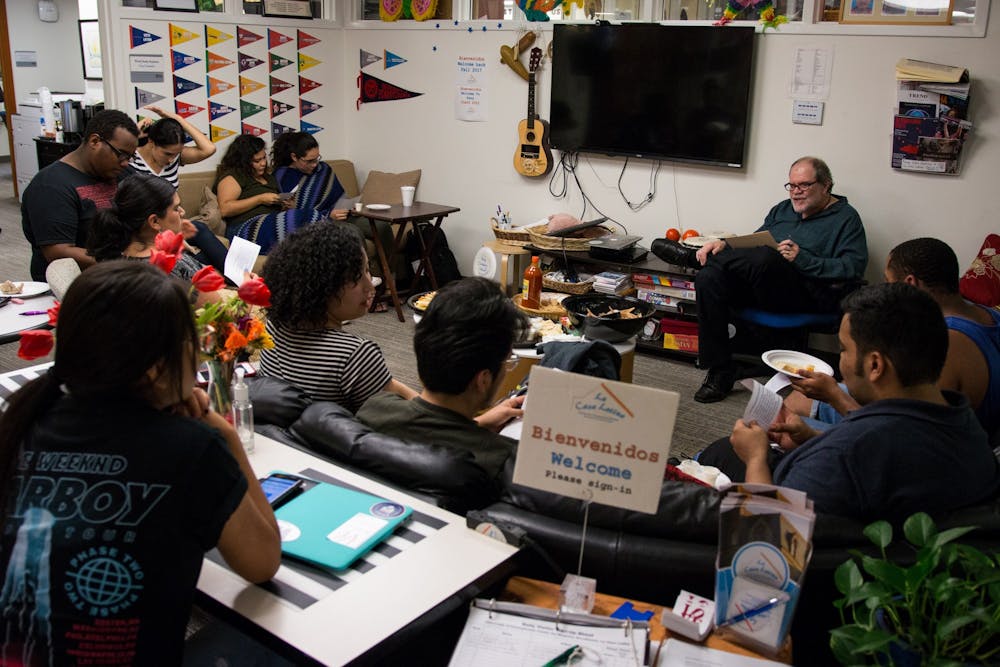
For the past 35 years, members of Penn's Latinx community have celebrated Latinx Heritage Month together on campus through speaker events, receptions, and marches down Locust Walk. This year, things were different. The events all took place online due to the COVID-19 pandemic, shaking up a long-standing tradition on Penn's campus.
While some students said the virtual setting could not match the same exciting atmosphere of the in-person traditions, most students and faculty still deemed this year's online celebrations an overall success.
La Casa Latina, the main hub for Latinx students at Penn, brought the spirit of Latinx Heritage Month to students' homes through virtual keynote lectures, games, symposiums, and panels. The events took place from Sept. 15 to Oct. 15 in correspondence with the national Hispanic Heritage Month.
Open House — an event that connects first-year students with the student leaders of over 35 Latinx student groups supported by La Casa Latina — kicked off Latinx Heritage Month on Sept. 14, La Casa Latina Associate Director Kareli Lizárraga said.
Rather than being a space for Latinx student groups to recruit students, however, the Open House this year consisted of games and breakout rooms as many Latinx student groups are currently inactive and no longer holding events due to the COVID-19 pandemic, College sophomore and La Casa Latina work-study staffer Ashley Blanco Liz said.
Lizárraga said the Open House, along with some other events, experienced lower turnout than normal. Anticipating the lower turnout as many students are burdened with time zone differences and at-home responsibilities, she said all events were recorded and uploaded to make them accessible to all students.
"Students spend a lot of time on Zoom looking at a screen, so they might not feel like participating in any extracurricular[s], which is completely understandable," Blanco Liz said. "It's a difficult time for everybody."
College senior and La Casa Latina work-study staffer Adriana Gonzalez-Camarena agreed, adding that it was difficult to emulate the atmosphere of La Casa Latina virtually. With in-person events, attendees could have conversations before, after, and in between events, which she said is difficult to do over Zoom.
Despite the inherent difficulties of maintaining a sense of community through online events, students and faculty said the Penn Latinx community will always feel like family no matter where they are in the world.

A screenshot from the virtual panel on activism in the Latinx community. (Photo from Kareli Lizárraga)
To introduce first-year students to their “familias," which are mentorship groups consisting of current undergraduates, graduate students, and alumni, La Casa Latina hosted Familias Kickoff on Sept. 16 over Zoom. La Casa Latina also introduced first years to upcoming events they could attend with their "familias," such as a webinar on Oct. 20 about coping with impacts of the coronavirus.
Lizárraga said that despite hosting Familias Kickoff virtually for the first time, she was "pleasantly surprised" the event recorded a higher attendance than it has had in previous years. She noted that the virtual nature of the event allowed more Penn graduates to attend.
Gonzalez-Camarena praised Familias Kickoff as a great opportunity for first years to meet other Penn students and to familiarize them with the Latinx community at Penn. Despite losing the in-person interactions, she said she still felt connected to Penn's Latinx community.
“Latinos can make a community anywhere,” she said.
La Casa Latina hosted four Grad Cenas, or graduate dinners, over Zoom during which recent graduates from the Class of 2020 reflected on their time at Penn. Typically intended to celebrate graduating seniors, the Grad Cenas during this year's Latinx Heritage Month recognized recent graduates that did not have the opportunity to share their stories when their on-campus experience was cut short in March due to the coronavirus outbreak.
Gonzalez-Camarena noted that the virtual setting of the Grad Cenas allowed Penn graduates from all over the world to attend the event rather than just alumni living in Philadelphia near campus.
Other events included a keynote lecture by nationally acclaimed poet Yosimar Reyes on Sept. 24, the fifth annual Penn in Latin America and the Caribbean Symposium which introduced students to research conducted by Penn faculty, staff, and students in Latin America and the Caribbean from Sept. 30 to Oct. 2, and a panel on activism in the Latinx community on Sept. 30.
The panel included speakers from organizations such as Juntos, a South Philadelphia-based organization working to advance the human rights of workers, parents, and immigrants, and CCATE, an organization that empowers the Latinx community through culture, art, and education.
University of California, Santa Barbara professor Evelyne Laurent-Perrault and Rutgers University professor Shantee Rosado also discussed on the panel the impacts of the COVID-19 pandemic and anti-Blackness on Black Latinx individuals in the U.S., Lizárraga said.
Gonzalez-Camarena said the panel felt more like a conversation than a lecture, engaging audience members and encouraging them to contribute to the discussion.
“A lot of the same spirit of exchanging ideas and advocating for our community and celebrating our community was still very much there,” Lizárraga said. “Students, alumni, and leaders [came] together to discuss the issues that are most impacting our community and also to celebrate the accomplishments and the contributions of Latinx communities across the country.”
The Daily Pennsylvanian is an independent, student-run newspaper. Please consider making a donation to support the coverage that shapes the University. Your generosity ensures a future of strong journalism at Penn.
Donate







